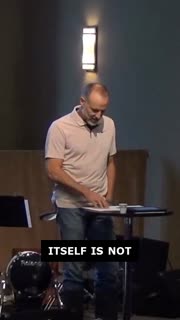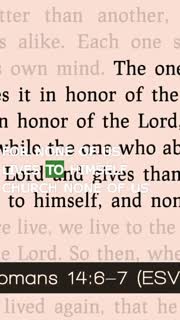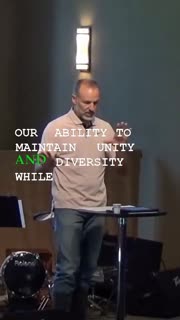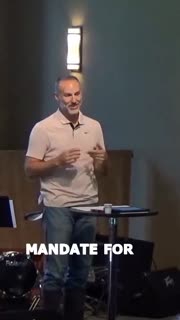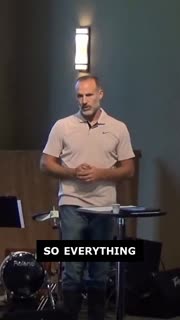Balancing Unity and Purity in Christian Community
Summary
### Summary
In today's sermon, we delved into the complex and often challenging topic of balancing unity and purity within the Christian community. We began by acknowledging the tension that arises when we judge others or feel judged for our convictions. The key to navigating these issues lies in relying on the Holy Spirit rather than our own fleshly desires. We explored how the Apostle Paul addressed similar tensions in the Roman church, where Jewish and Gentile believers struggled to coexist due to their differing cultural and religious practices.
Paul's message in Romans 14 and 15 emphasizes the importance of prioritizing love and acceptance over judgment and division. He urges believers to preserve unity while pursuing holiness, a task that requires the guidance of the Holy Spirit. We discussed how unity is easy if we disregard purity, and purity is easy if we exclude others, but the true challenge lies in maintaining both.
The historical context of the Roman church was crucial to understanding Paul's message. The Jewish believers, who had been exiled from Rome and then returned, found their practices clashing with those of the Gentile believers. This led to disputes over issues like dietary laws and the observance of special days. Paul calls for mutual respect and understanding, urging both groups to honor the Lord in their practices without causing others to stumble.
We also touched on the broader implications of Paul's teachings for our lives today. Whether it's dealing with cultural differences, personal convictions, or communal living, the call is to live in a way that honors the Lord and builds up the community. This involves a commitment to love, curiosity, and genuine conversation, always seeking to understand and uplift one another.
Ultimately, the sermon calls us to a higher standard of living, one that reflects the transformative power of the gospel. By relying on the Holy Spirit, we can navigate the complexities of unity and purity, demonstrating to the world the love and lordship of Jesus Christ.
### Key Takeaways
1. Rely on the Holy Spirit: Navigating issues within the Christian community requires the guidance of the Holy Spirit. Operating in the flesh leads to division and judgment, but the Spirit brings wisdom and unity. Always seek the Spirit's guidance in conversations and decisions. [01:31]
2. Preserve Unity and Pursue Holiness: Unity is easy if we disregard purity, and purity is easy if we exclude others. The real challenge is maintaining both. This requires mutual respect and understanding, prioritizing love over judgment. [04:23]
3. Understand Historical Context: The tensions in the Roman church between Jewish and Gentile believers highlight the importance of understanding cultural and historical contexts. This helps us apply biblical principles more accurately in our own diverse communities. [07:21]
4. Live to Honor the Lord: Every action, whether eating, drinking, or any other activity, should be done to honor the Lord. This mindset helps us avoid behaviors that are not in line with our faith and promotes a life of integrity and devotion. [11:50]
5. Commit to Love and Curiosity: Building a genuine Christian community involves being curious about others' convictions and experiences. Engage in conversations with a spirit of love and curiosity, seeking to understand and uplift one another rather than judge. [47:50]
### YouTube Chapters
[0:00] - Welcome
[01:31] - Relying on the Holy Spirit
[02:47] - Context of Romans 14 and 15
[04:23] - Unity and Purity
[05:57] - Jewish and Gentile Tensions
[07:21] - Cultural and Historical Context
[08:53] - Filled with the Spirit
[10:11] - Casting Off Darkness
[11:50] - Honoring the Lord
[13:14] - Judging Others
[15:44] - Meat Sacrificed to Idols
[17:04] - Pagan Worship Practices
[20:16] - Gentile and Jewish Perspectives
[23:31] - Living for the Lord
[25:00] - Accountability to God
[27:55] - Jesus is Lord
[30:58] - Stumbling Blocks
[33:51] - Righteousness, Peace, and Joy
[35:22] - Acceptable Sacrifice
[37:09] - Freedom and Conscience
[39:38] - God's Plan for the Nations
[41:49] - Welcoming One Another
[43:55] - Unity in Diversity
[46:43] - Transformative Power of the Gospel
[47:50] - Love and Curiosity
[50:18] - Love Defined
[52:08] - Speaking Truth in Love
[54:05] - Feasting in the Name of Jesus
[55:42] - Commitment to Unity and Holiness
Study Guide
### Bible Reading
1. Romans 14:1-4 (ESV)
> "As for the one who is weak in faith, welcome him, but not to quarrel over opinions. One person believes he may eat anything, while the weak person eats only vegetables. Let not the one who eats despise the one who abstains, and let not the one who abstains pass judgment on the one who eats, for God has welcomed him. Who are you to pass judgment on the servant of another? It is before his own master that he stands or falls. And he will be upheld, for the Lord is able to make him stand."
2. Romans 14:13-19 (ESV)
> "Therefore let us not pass judgment on one another any longer, but rather decide never to put a stumbling block or hindrance in the way of a brother. I know and am persuaded in the Lord Jesus that nothing is unclean in itself, but it is unclean for anyone who thinks it unclean. For if your brother is grieved by what you eat, you are no longer walking in love. By what you eat, do not destroy the one for whom Christ died. So do not let what you regard as good be spoken of as evil. For the kingdom of God is not a matter of eating and drinking but of righteousness and peace and joy in the Holy Spirit. Whoever thus serves Christ is acceptable to God and approved by men. So then let us pursue what makes for peace and for mutual upbuilding."
3. Romans 15:1-7 (ESV)
> "We who are strong have an obligation to bear with the failings of the weak, and not to please ourselves. Let each of us please his neighbor for his good, to build him up. For Christ did not please himself, but as it is written, 'The reproaches of those who reproached you fell on me.' For whatever was written in former days was written for our instruction, that through endurance and the encouragement of the Scriptures we might have hope. May the God of endurance and encouragement grant you to live in such harmony with one another, in accord with Christ Jesus, that together you may with one voice glorify the God and Father of our Lord Jesus Christ. Therefore welcome one another as Christ has welcomed you, for the glory of God."
### Observation Questions
1. What specific issues were causing tension between Jewish and Gentile believers in the Roman church? ([05:57])
2. According to Romans 14:1-4, how should believers treat those who have different convictions about what they eat?
3. What does Paul mean when he says, "Let us pursue what makes for peace and for mutual upbuilding" in Romans 14:19?
4. How does Paul describe the relationship between the strong and the weak in faith in Romans 15:1-2?
### Interpretation Questions
1. Why does Paul emphasize the importance of not passing judgment on one another in Romans 14:13-19? How does this relate to the concept of walking in love? ([30:58])
2. How can understanding the historical context of the Roman church help us apply Paul's teachings to our own diverse communities today? ([07:21])
3. What does it mean to "live to honor the Lord" in every action, as discussed in the sermon? How can this mindset influence our daily decisions? ([11:50])
4. How does the sermon suggest we balance unity and purity within the Christian community? What role does the Holy Spirit play in this process? ([04:23])
### Application Questions
1. Reflect on a time when you felt judged for your convictions or judged someone else for theirs. How can you seek the Holy Spirit's guidance to navigate such situations in the future? ([01:31])
2. In what ways can you prioritize love and acceptance over judgment and division in your interactions with others? Think of a specific relationship where you can apply this principle. ([04:23])
3. How can you better understand and respect the cultural and historical contexts of others in your community? What steps can you take to learn more about their backgrounds and practices? ([07:21])
4. Consider your daily actions and decisions. How can you ensure that they honor the Lord? Identify one specific area of your life where you can make a change to better reflect this commitment. ([11:50])
5. How can you cultivate a spirit of love and curiosity in your conversations with others? Think of a recent conversation where you could have been more curious and loving. How would you approach it differently now? ([47:50])
6. What are some practical ways you can contribute to building up your Christian community? Identify one specific action you can take this week to support and uplift someone in your church. ([33:51])
7. Reflect on the concept of unity and purity. How can you personally work towards maintaining both in your life and within your church community? What challenges do you anticipate, and how can you overcome them? ([04:23])
Devotional
Day 1: Guided by the Holy Spirit
Relying on the Holy Spirit is essential for navigating issues within the Christian community. When we operate in our own flesh, we often fall into patterns of division and judgment. However, the Holy Spirit brings wisdom, unity, and the ability to see beyond our own limited perspectives. By seeking the Spirit's guidance in our conversations and decisions, we can foster a community that reflects the love and grace of Christ. This reliance on the Holy Spirit is not a one-time event but a daily commitment to surrender our will and desires to God's leading. [01:31]
Ephesians 4:3-4 (ESV): "Eager to maintain the unity of the Spirit in the bond of peace. There is one body and one Spirit—just as you were called to the one hope that belongs to your call."
Reflection: Think of a recent conflict or disagreement you had within your community. How can you invite the Holy Spirit into that situation to bring wisdom and unity?
Day 2: Balancing Unity and Holiness
Maintaining both unity and holiness within the Christian community is a challenging but essential task. Unity can be easily achieved if we disregard purity, and purity can be easily maintained if we exclude others. However, the true challenge lies in preserving both. This requires mutual respect, understanding, and prioritizing love over judgment. By doing so, we honor God and build a community that reflects His character. [04:23]
1 Peter 1:22 (ESV): "Having purified your souls by your obedience to the truth for a sincere brotherly love, love one another earnestly from a pure heart."
Reflection: Consider a time when you felt judged or excluded because of your convictions. How can you extend love and understanding to someone with different beliefs or practices today?
Day 3: Embracing Cultural and Historical Contexts
Understanding the cultural and historical contexts of biblical teachings helps us apply them more accurately in our diverse communities. The tensions in the Roman church between Jewish and Gentile believers highlight the importance of this understanding. By recognizing the historical background, we can better appreciate the principles of mutual respect and honor that Paul emphasized. This awareness allows us to navigate our own cultural differences with grace and wisdom. [07:21]
Acts 15:19-20 (ESV): "Therefore my judgment is that we should not trouble those of the Gentiles who turn to God, but should write to them to abstain from the things polluted by idols, and from sexual immorality, and from what has been strangled, and from blood."
Reflection: Think about a cultural or historical context that has influenced your faith practices. How can you use this understanding to foster greater unity and respect within your community?
Day 4: Living to Honor the Lord
Every action we take, whether eating, drinking, or any other activity, should be done to honor the Lord. This mindset helps us avoid behaviors that are not in line with our faith and promotes a life of integrity and devotion. By focusing on honoring God in all we do, we can live lives that reflect His love and righteousness to those around us. [11:50]
Colossians 3:17 (ESV): "And whatever you do, in word or deed, do everything in the name of the Lord Jesus, giving thanks to God the Father through him."
Reflection: Identify one daily habit or activity that you can intentionally do to honor the Lord. How will this change your approach to that activity?
Day 5: Committing to Love and Curiosity
Building a genuine Christian community involves being curious about others' convictions and experiences. Engaging in conversations with a spirit of love and curiosity allows us to understand and uplift one another rather than judge. This commitment to love and curiosity fosters a supportive and inclusive community where everyone feels valued and heard. [47:50]
Romans 12:10 (ESV): "Love one another with brotherly affection. Outdo one another in showing honor."
Reflection: Think of someone in your community whose convictions or experiences differ from yours. How can you engage them in a conversation with genuine curiosity and love today?
Quotes
1. "We can't get through issues in the family if we're operating in the flesh, according to our own desires, our own powers, our own, what we want, what I want, what I think is good, right? It's going to have to be by the Spirit. And I wonder if sometimes in church life we've just said, okay, thanks Jesus, we'll take it from here. We get the basic idea and now we'll just run it. We'll just do it. We'll just do it. And I just think the flesh is always going to win unless we submit to the Spirit." [01:31] (31 seconds)
2. "When we address big issues without the guidance of the Spirit, whether that's cultural issues or just interpersonal issues, marriage issues, relationship, whatever, oh, wow, we're in for some trouble. And you're like, well, you don't need the Spirit because the issue is just a biblical issue. It's just biblical. You're just, it's right or wrong. It's black and white. It's biblical. And also, but are we going to do that in the flesh? Or are we going to do that with the Spirit, continually guiding us in there?" [02:47] (28 seconds)
3. "It's been said that unity is, it's easy if you don't care about purity. Oh, let's just all just, let's all just, come on, no big deal, whatever, no big deal. Unity is easy if you don't care about purity. And purity is somewhat, it takes care of itself if you just keep dividing over, well, you're not with us anymore because you're not with us anymore, you're not with us. And then you maintain this very pure, but usually very, very small circle. Sometimes you're the only one in it, right? Because you are so pure in your own eyes." [04:23] (37 seconds)
4. "The church itself is not the world's world is not made up of natural friends. It's actually made of natural enemies. What binds us together is not common education, common race, common income levels, common politics, common nationality, common accents, common jobs or anything else of that sort. Christians come together not because they form a natural co-location but because they have all been saved by Jesus Christ and owe him a common allegiance." [20:16] (25 seconds)
5. "For none of us lives to himself church none of us lives to himself or herself well I don't know I'm just not feeling it personally like okay well what about the church how's the church none of us lives to himself and none of us dies to himself for if we live we live to the lord and if we die we die to the lord so then whether we live or whether we die we are the lords these are emphatic statements and I don't know how to impress them upon you more than paul is his duplication the reduplication I'm gonna this is our life before the lord together." [23:31] (37 seconds)
6. "Our ability to maintain unity and diversity while pursuing holiness is going to demonstrate this transformative power of gospel to a watching world. Jesus Christ is Lord of all. Do you think you can accomplish that in your own flesh if you're pursuing your own desires and what makes good for you? You're not going to. That's going to be just the normal, normal stuff. You're going to look like everybody else in the culture who's like, eh, they're not like me. Eh. That's right. They're not like you. That's not how we gather. That's not why we gathered here. Because you like them or you are like them. That's not why you gathered here. It's because of Jesus." [46:43] (39 seconds)
7. "This is our mandate for world mission. This is our mandate for go across the cold. This is our mandate for look across the way at your apartment complex and realize, oh, the nations have come here. Let's go. Because Jesus is worthy of all of that. He's worthy, worthy, worthy to be praised by all the nations, all of God's people. This is what the letter of Romans has been heading toward. Hey, sit at the table. I don't like him. He's dirty. Yes, sit at the table. He's been cleaned by the blood of Jesus Christ. He's been purified. He's now... He's in a simple space just like you are." [45:29] (39 seconds)
8. "So as we leave, let's just commit to the challenging but rewarding pathway of following Jesus in the midst of pursuing holiness, purity, and our community together. Welcoming one another as Christ has welcomed us to the glory of God. And this will not, I keep saying it, will not happen in the flesh. It's only going to be by the power of the Spirit." [55:42] (25 seconds)
9. "So we have to be careful of our face when people start coming to Jesus. Careful. What do you say? Oh, yeah, I'm the worst. Like, no, no, you made the best decision. You're coming to Jesus. So we have to be careful of that as a family. So that's one thing to think about. Because we've talked about this definition. I'm sticking with it. Love is a rugged, affective, so we've got feeling to it. It's not just, you know. But it's a rugged, affective feeling or affective commitment to be with another person. So that's presence. And to be for another person, that's advocacy. And unto Christ's likeness. That's direction." [50:18] (44 seconds)
10. "So everything we do, are we going to do it to honor the Lord? And if we could get into that mindset, oh, wow, I think we could start to see those behavioral issues and some of those different things change. The final thing is just, obviously, in essentials, we've got to be unified. In non-essentials, we need to offer each other liberty. And in all things, we've got to live that way together." [54:53] (24 seconds)



